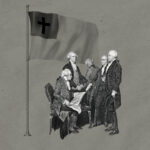The Story: A new survey reveals Americans—including evangelicals—are often confused about what constitutes cheating and adultery.
The Background: A recent survey commissioned by Deseret News finds large majorities of Americans believe that behaviors involving physical sexual contact with someone else, such as one-night stands or romantic kissing, always count as cheating. There is more disagreement, though, as to what is acceptable for many other behaviors.
The survey looks at how the general population as well as subgroups based on gender, race, and a variety of religious subgroups, answer the question, “How often, if ever, would you say the following activities would be cheating on a spouse or partner?” Here are the results for evangelicals:
Following an ex on social media (23 percent)
• Watching pornography without your partner (31 percent)
• Going to a strip club without your partner (37 percent)
• Going out to dinner with someone that you are attracted to (53 percent)
• Sending flirtatious messages to someone besides your partner (58 percent)
• Being emotionally involved with someone besides your partner (67 percent)
• Actively maintaining an online dating profile (68 percent)
• Sending sexually explicit messages to someone other than your partner (75 percent)
• Romantically kissing someone other than your partner (78 percent)
• Having a one-night stand with someone other than your partner (77 percent)
• Having regular sexual relations with someone other than your partner (82 percent)
On this question, evangelicals are more conservative than the national average on all of the behaviors asked about.
The survey also asked, “Would you be more likely or less likely to support a candidate for president who had an extramarital affair in the past, or wouldn’t this matter to you?” Only 43 percent of evangelicals said that an affair would negatively affect their vote.
Why It Matters: As with any polling results, we should be careful about drawing overly broad assumptions based on a single survey. But if the results are anywhere close to accurate we should be worried both for the American public and the evangelical community.
A generation ago Christians were dismissive of the idea that the president of the United States, a married man, could truly be confused about what constituted “sex” with a woman who wasn’t his wife. But today we can’t take for granted that people really are clear on what does constitute cheating. And the fact that almost one in five evangelicals don’t consider it cheating when a person is having regular sexual relations with someone other than one’s spouse is a clear sign that sex education in at least some of our churches has failed.
The problem is also a matter of race, gender, and education. In the general population, blacks (67 percent) and Hispanics (66 percent) are much less likely than whites (80 percent) to consider regular sexual activity with someone other than their partner to be cheating. The same is true for those with post-graduate or college education (95 percent and 81 percent) as compared to those with some college (74 percent) or high school or less (72 percent). There is also a gap, albeit smaller, between men (74 percent) and women (78 percent).
Findings like this show we can no longer assume that even those in our churches are aware of what constitutes inappropriate sexual behavior. Before we can convey a biblical view of sexual ethics we may need to do explain the meaning of terms like adultery and the importance of basic concepts like fidelity.
Of course that remedial education may need to start with the person behind the pulpit. For the past couple of years we’ve had evangelical pastors downplaying the sexual misconduct and adultery of politicians, sometimes making the excuse that we aren’t “electing Sunday school teachers.”
When men of the gospel can overlook breaking a vow taken before God for pragmatic reasons, it is all that surprising that evangelicals are getting the message that adultery is so insignificant it shouldn’t even be considered “cheating”?
Download your free Christmas playlist by TGC editor Brett McCracken!
 It’s that time of year, when the world falls in love—with Christmas music! If you’re ready to immerse yourself in the sounds of the season, we’ve got a brand-new playlist for you. The Gospel Coalition’s free 2025 Christmas playlist is full of joyful, festive, and nostalgic songs to help you celebrate the sweetness of this sacred season.
It’s that time of year, when the world falls in love—with Christmas music! If you’re ready to immerse yourself in the sounds of the season, we’ve got a brand-new playlist for you. The Gospel Coalition’s free 2025 Christmas playlist is full of joyful, festive, and nostalgic songs to help you celebrate the sweetness of this sacred season.
The 75 songs on this playlist are all recordings from at least 20 years ago—most of them from further back in the 1950s and 1960s. Each song has been thoughtfully selected by TGC Arts & Culture Editor Brett McCracken to cultivate a fun but meaningful mix of vintage Christmas vibes.
To start listening to this free resource, simply click below to receive your link to the private playlist on Spotify or Apple Music.


































